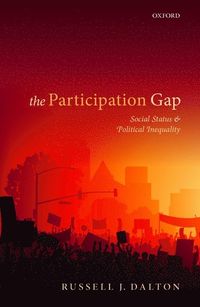
spara 61%
2 säljare
The Participation Gap
The dilemma of democracy arises from two contrasting trends. More people in the established democracies are participating in civil society activity, contacting government officials, protesting, and using online activism and other creative forms of participation. At the same time, the importance of social status as an influence on political activity is increasing. The democratic principle of the equality of voice is eroding. The politically rich are getting richer-and the politically needy have less voice. This book assembles an unprecedented set of international public opinion surveys to identify the individual, institutional, and political factors that produce these trends. New forms of activity place greater demands on participants, raising the importance of social status skills and resources. Civil society activity further widens the participation gap. New norms of citizenship shift how people participate. And generational change and new online forms of activism accentuate this process. Effective and representative government requires a participatory citizenry and equal voice, and participation trends are undermining these outcomes. The Participation Gap both documents the growing participation gap in contemporary democracies and suggests ways that we can better achieve their theoretical ideal of a participatory citizenry and equal voice.
Utgiven: 2017
ISBN: 9780198733607
Förlag: OUP Oxford
Format: Inbunden
Språk: Engelska
Sidor: 254 st
The dilemma of democracy arises from two contrasting trends. More people in the established democracies are participating in civil society activity, contacting government officials, protesting, and using online activism and other creative forms of participation. At the same time, the importance of social status as an influence on political activity is increasing. The democratic principle of the equality of voice is eroding. The politically rich are getting richer-and the politically needy have less voice. This book assembles an unprecedented set of international public opinion surveys to identify the individual, institutional, and political factors that produce these trends. New forms of activity place greater demands on participants, raising the importance of social status skills and resources. Civil society activity further widens the participation gap. New norms of citizenship shift how people participate. And generational change and new online forms of activism accentuate this process. Effective and representative government requires a participatory citizenry and equal voice, and participation trends are undermining these outcomes. The Participation Gap both documents the growing participation gap in contemporary democracies and suggests ways that we can better achieve their theoretical ideal of a participatory citizenry and equal voice.
Begagnad bok
339 kr865 krSpara 526 kr (61%) mot nypris
Fri frakt & skickas inom 1-3 vardagar
Köpskydd med Studentapan
Varje köp täcks av Studentapans köpskydd som säkerställer att boken kommer fram, att du får rätt bok och att skicket stämmer överens med beskrivning.



